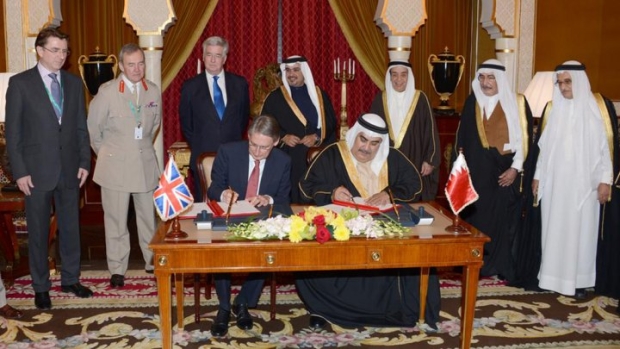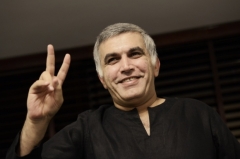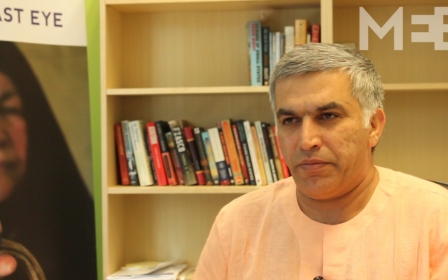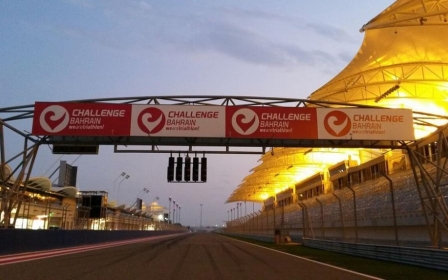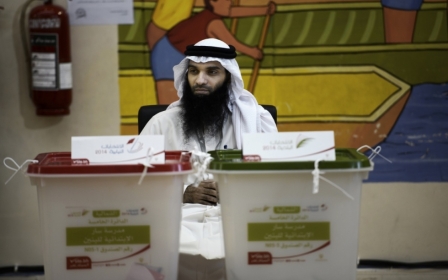Anger in Bahrain over first British base 'east of Suez' in 40 years
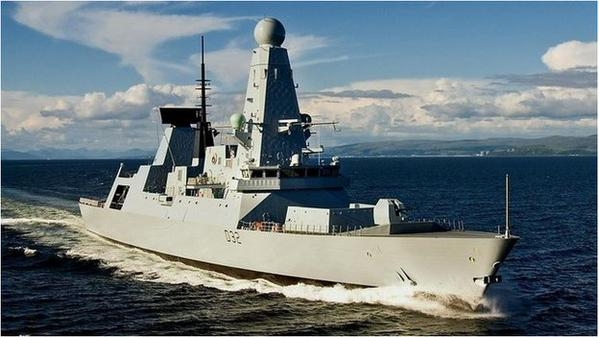
The announcement that the UK is to build a new naval base in Bahrain has provoked rage from activists in the tiny Gulf kingdom, who say the decision is a “reward for Britain’s silence” over the kingdom’s poor human rights record.
The governments of the UK and Bahrain inked a deal on Saturday that will see Britain establish its first military base in the Middle East since it formally withdrew from the region in 1971.
Bahrain will contribute most of the $23mn needed to establish a new base at the Mina Salman Port, an existing facility jutting out from the eastern edge of the island and separated from the coast of Iran by some 220 kilometres of Persian Gulf waters.
The British will pay upkeep costs going forward after the base is established.
The historic deal was announced at a security forum hosted by the International Institute for Strategic Studies in Manama, Bahrain’s capital, on Saturday.
Bahrain’s Foreign Minister Sheikh Khalid said the agreement “reaffirms our joint determination to maintain regional security and stability in the face of challenging circumstances".
Khalid added that the kingdom looks forward “to continuing to work with the UK and other partners to address threats to regional security".
The US already has a naval base in Bahrain, known as the Naval Support Activity (NSA) base. Its ownership was transferred from the British navy to the US forces in the 1970s after the UK’s withdrawal from the region.
Khalid’s British counterpart Philip Hammond, who signed the deal on behalf of his government, said the move is “just one example of our growing partnership with Gulf partners to tackle shared strategic and regional threats".
‘Permanent expansion’ east of Suez
Though the UK officially withdrew from active operations in the region over four decades ago, it has always maintained a presence.
Hammond pointed on Saturday to Britain’s “30-year track record of Gulf patrols,” saying the new base would allow the UK to build co-operation with Gulf States.
The UK already has four minesweeper ships stationed in Bahrain on a rotating basis, but currently has to piggyback off the US naval base there.
Saturday’s deal is a reversal of a decision taken by the UK government in 1968, when then-Prime Minister Harold Wilson announced that British forces would withdraw from major military bases in the region by 1971.
Referencing that decision, widely seen as a landmark for Britain’s imperialist adventures in the Persian Gulf, Hammond said on Saturday that the new deal shows Britain’s “commitment to a sustained presence east of Suez".
A report published last year by the Royal United Services Institute (RUSI), a think tank with strong links to the military, said the UK is attempting to establish a “strong shadow presence” around the Gulf.
UK defence secretary Michael Fallon agreed with this assessment, calling the new base in Bahrain “a permanent expansion of the Royal Navy's footprint…in the Gulf".
"We will now be based again in the Gulf for the long term.”
Angry reaction against Bahrain's rulers
Responding to the news, Bahraini activists took to the streets in the restive eastern province of Sitra over the weekend, shooting red flares into the air and cheering in celebration as they set fire to what appears to be a police vehicle.
Police fired volleys of tear gas to disperse the crowds. No injuries were reported.
Earlier, hundreds of protesters had marched through the streets waving Bahraini flags and carrying a banner that read “Shut up, Iain Lindsay,” a message to the UK’s ambassador in Bahrain since August 2011.
Commenting on the deal, the opposition February 14 Coalition dubbed it a “shady agreement that reveals the true extent of the ruling class’s complete prostration to foreign occupation and imperialism".
Human rights activist Sayyid Yousef al-Muhafiza, meanwhile, said the deal itself was “illegitimate,” because it was taken “by the King and his family” without the agreement of the people.
“The base and British imperialism in the base” must be countered, Muhafiza said in a statement on Sunday.
UK 'taking the side of the oppressive regime'
While many opposition figures within Bahrain denounced the ruling family for signing the agreement, others also raised concerns over the British government’s part in the deal.
Rajab, the head of the Bahrain Centre for Human Rights who spoke while on bail for posting “offensive tweets,” said “the British government has always taken the side of the oppressive regime and all the dictators in the Gulf region".
Britain has long been a close ally of Bahrain, and has come under criticism for failing to speak out about what Human Rights Watch calls the continued “arbitrary” arrest of scores of individuals during anti-government protests.
The deal comes just days after pro-democracy activist Zainab al-Khawaja was jailed for three years for ripping up a picture of Bahrain’s King Hamad.
Activists have responded with anger to what they see as a stepping up of military co-operation after decades of reticence.
However, RUSI’s 2013 report found that the UK never fully withdrew militarily from the Gulf – the current build-up of British presence in the region, according to the report, is “more evolutionary than revolutionary".
During the past three years, activists have documented the use of UK and US-made tear gas and birdshot by Bahraini police to quell anti-government demonstrations.
Since 2008, the UK has also sold some $48.9mn in military equipment to Bahrain, including gun silencers and anti-riot shields.
With concerns around the Bahraini government’s use of force against its own citizens growing, Kenneth Roth, executive director of Human Rights watch, slammed the timing of the UK government’s decision.
“As Bahrain pursues a brutal crackdown, what better time for the UK to build a military base there?”
Stay informed with MEE's newsletters
Sign up to get the latest alerts, insights and analysis, starting with Turkey Unpacked
Middle East Eye delivers independent and unrivalled coverage and analysis of the Middle East, North Africa and beyond. To learn more about republishing this content and the associated fees, please fill out this form. More about MEE can be found here.


